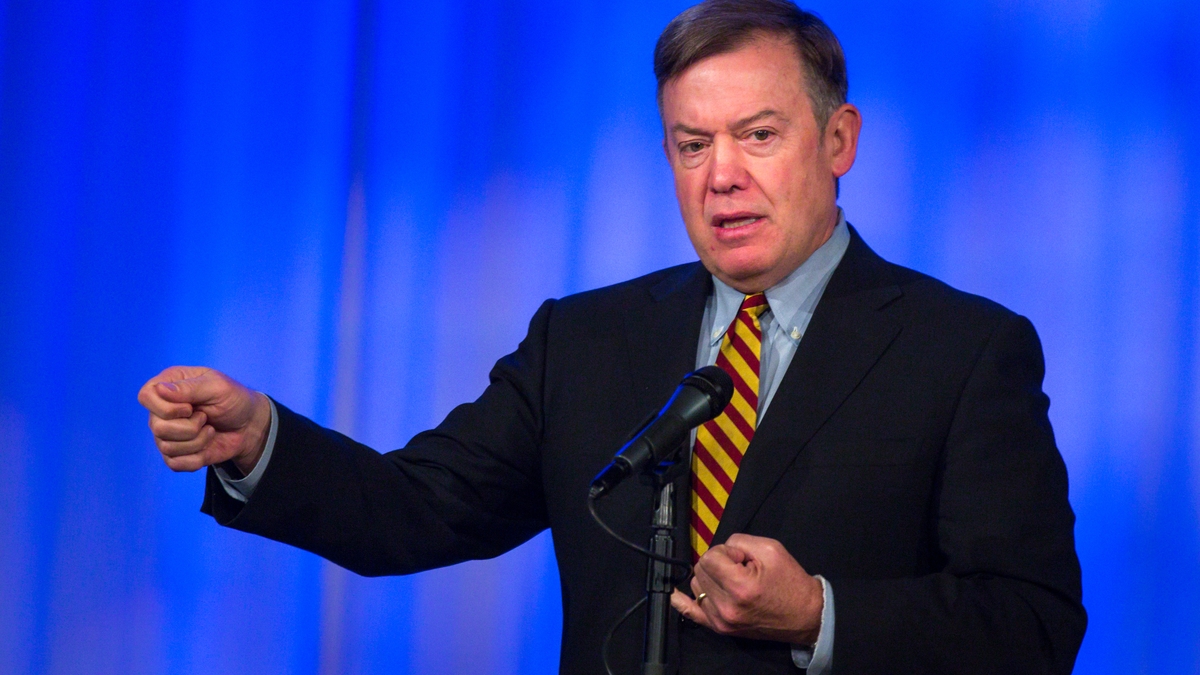Arizona should move to a simpler funding model for higher education and set a goal for increasing the number of college graduates to help drive the state’s economy, according to Arizona State University President Michael M. Crow.
“It is our role, our job, our function to figure out how to take that one variable, education attainment, and drive it forward,” Crow told a crowd of legislators and ASU advocates at the KAET studio on the Downtown Phoenix campus on Tuesday.
Crow (pictured above) says that ASU is geared up to continue producing some of those graduates, having already raised the quality of programs and number of degrees over the past decade through innovation, a topic he is scheduled to address at a town hall tonight.
The audience at the Sun Devil Advocate Legislative Network Breakfast included many members of the state Legislature, who began their session this week, and Crow told them that there have always been arguments that education is too expensive or unnecessary. It is college education, though, that has driven the social and economic transformations of the nation over the past century, he said. The technology and capabilities that the public takes for granted and the brainpower that made it all possible all are the product of college education, Crow said. The future advances produced by educational attainment will drive the next transformations.
“Can you imagine the arguments they had in 1905 when some fool walked up on stage and said, ‘I have to get all these farmers high school diplomas’?” he said.
“I can guarantee that reductions in educational attainment, with fewer people going to college, fewer people learning to become master learners, as a percentage of the population, won’t produce good outcomes.”
ASU has increased the number of people earning degrees from more than 14,000 in 2007 to roughly 20,000 last year.
He said that ASU’s Ira A. Fulton Schools of Engineering have increased the number of graduates by two and a half times, as well as boosted the freshmen retention rate from 68 percent to more than 90 percent.
“We’ve done all that while investments from our principal investor, the state, have gone down,” Crow said.
State Sen. John Kavanagh (left) talks with ASU President Michael Crow before the Sun Devil Advocates Network Breakfast in the KAET studio Tuesday. President Crow and College Success Arizona head Rich Nickel laid out the case for increased funding for ASU to members of the state Legislature. Photos by Charlie Leight/ASU Now
Crow implored the legislators to consider the Arizona Board of Regents’ proposed funding model, which asks the state to fund half the cost of educating in-state students. Currently, state funding covers about a third of that costAccording to statistics supplied by the Arizona Board of Regents, which governs the three state universities, the annual resident per-student cost is about $15,550, an average of the three state universities. That number includes academic, support and maintenance programs, but not research or capital expenditures. In 2016, the state will fund about $5,302 per resident student. Tuition and fees cover about $6,554. That means the three state universities must cover the remaining $3,694, which comes from sources including the increased tuition paid by out-of-state and international students. The Arizona Board of Regents is proposing that the state eventually increase its investment to $7,775 per in-state student..
In his “state of the state” speech Monday, Gov. Doug Ducey said he valued the Arizona’s three public universities but gave no funding details. The current budget cut $99 million in university funding. Ducey will release his 2017 budget proposal Friday.
Crow said the state’s universities have long wanted a performance-based funding model that would reward them for success in hitting specific metrics.
Currently, Arizona is one of 19 states that have no goal for educational attainment, which would include professional certificates and two-year associate’s degrees as well as bachelor's degrees. For example, Colorado’s goal is to increase the number of adults ages 25 to 34 in the state holding postsecondary degrees or certificates to 66 percent by 2025.
“Setting a goal would provide a beacon of light for everyone to move toward, and it doesn’t cost a dollar,” said Rich Nickel Rich Nickel is president and CEO of College Success Arizona, a non-profit group that provides scholarships and mentoring and seeks to raise awareness of the importance of college completion., president and CEO of College Success Arizona, who also spoke at the event.
Rich Nickel is president and CEO of College Success Arizona, a non-profit group that provides scholarships and mentoring and seeks to raise awareness of the importance of college completion., president and CEO of College Success Arizona, who also spoke at the event.
“If you’re looking at regional competition and other states around us who are doing well economically and have said that a certain percentage of their population needs to have degrees to fill jobs, maybe it’s something we should consider also,” Nickel said.
His organization doesn’t advocate for a specific goal.
“The goal needs to be thoughtfully considered, but I would not expect Arizona to come in at less than 50 percent,” he said.
Currently about 37 to 40 percent of Arizonans have a degree or certificate, Nickel said, adding that about 68 percent of jobs in Arizona will require post-secondary training by 2020.
State Sen. John Kavanagh, a Republican who represents Fountain Hills, said that setting a goal can be a roadmap to the future.
“If they’re measurable, as Dr. Crow wants them to be, then they also let those who invested, the taxpayers and the students, know there will be accountability.”
More Arts, humanities and education

Grand Canyon National Park superintendent visits ASU, shares about efforts to welcome Indigenous voices back into the park
There are 11 tribes who have historic connections to the land and resources in the Grand Canyon National Park. Sadly, when the park was created, many were forced from those lands, sometimes at…
ASU film professor part of 'Cyberpunk' exhibit at Academy Museum in LA
Arizona State University filmmaker Alex Rivera sees cyberpunk as a perfect vehicle to represent the Latino experience.Cyberpunk is a subgenre of science fiction that explores the intersection of…

Honoring innovative practices, impact in the field of American Indian studies
American Indian Studies at Arizona State University will host a panel event to celebrate the release of “From the Skin,” a collection over three years in the making centering stories, theories and…

